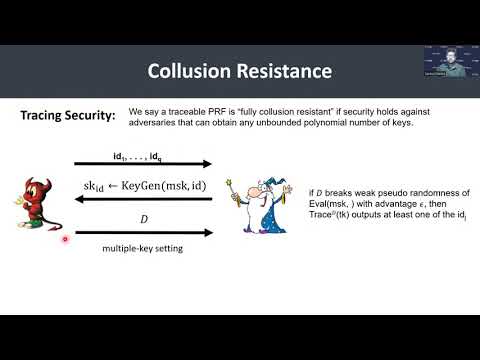CryptoDB
Traceable PRFs: Full Collusion Resistance and Active Security
| Authors: |
|
|---|---|
| Download: | |
| Conference: | PKC 2022 |
| Abstract: | The main goal of traceable cryptography is to protect against unauthorized redistribution of cryptographic functionalities. Such schemes provide a way to embed identities (i.e., a "mark") within cryptographic objects (e.g., decryption keys in an encryption scheme, signing keys in a signature scheme). In turn, the tracing guarantee ensures that any "pirate device" that successfully replicates the underlying functionality can be successfully traced to the set of identities used to build the device. In this work, we study traceable pseudorandom functions (PRFs). As PRFs are the workhorses of symmetric cryptography, traceable PRFs are useful for augmenting symmetric cryptographic primitives with strong traceable security guarantees. However, existing constructions of traceable PRFs either rely on strong notions like indistinguishability obfuscation or satisfy weak security guarantees like single-key security (i.e., tracing only works against adversaries that possess a single marked key). In this work, we show how to use fingerprinting codes to upgrade a single-key traceable PRF into a fully collusion resistant traceable PRF, where security holds regardless of how many keys the adversary possesses. We additionally introduce a stronger notion of security where tracing security holds even against active adversaries that have oracle access to the tracing algorithm. In conjunction with known constructions of single-key traceable PRFs, we obtain the first fully collusion resistant traceable PRF from standard lattice assumptions. Our traceable PRFs directly imply new lattice-based secret-key traitor tracing schemes that are CCA-secure and where tracing security holds against active adversaries that have access to the tracing oracle. |
Video from PKC 2022
BibTeX
@inproceedings{pkc-2022-31703,
title={Traceable PRFs: Full Collusion Resistance and Active Security},
publisher={Springer-Verlag},
author={Sarasij Maitra and David J. Wu},
year=2022
}

